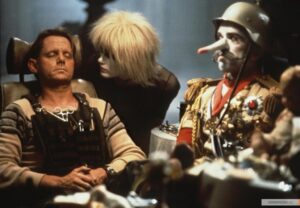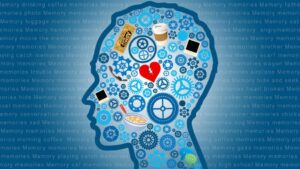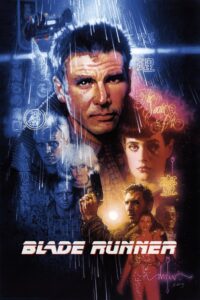“We’re not computers, we’re physical. I think, therefore I am.” These words are spoken in the famous movie Blade Runner by a Replicant, a synthetically created humanoid designed to replicate human behavior, thought, and action. Those words, rooted in philosophical thought on human life and its characteristics, pose a fundamental question in Blade Runner: what does it mean to be human?
Blade Runner is a science fiction film released in 1982, featuring prominent actors and actresses such as Harrison Ford, Sean Young, and Rutger Hauer. Inspired by the book Do Androids Dream of Electric Sheep, written by author Phillip K. Dick, the movie depicts a futuristic and dystopian world where the Earth has become polluted by nuclear war and greenhouse gas emissions, forcing humans into crowded megacities.
In this bleak setting, we find our reluctant hero, Rick Deckard, a police officer for the Los Angeles Police Department. He’s a blade runner, a type of law enforcement agent specifically tasked with hunting down rogue or dangerous replicants. Deckard is tasked with hunting down 4 replicants who have arrived on Earth for an unknown reason. This sets him on a path of discovery as he interacts with a multitude of replicant characters, and events occur that make him question his very purpose and the morality of his mission.

Some of the numerous questions posed by Blade Runner include: what makes humans unique, and can we truly create the rational intellect of the replicants? What about the replicants makes them different from us? Philosophically speaking, do replicants have the capacity to be similar to humans in emotion, intellect, and thought?
Blade Runner’s philosophical questions
To help with these complex metaphysical questions, I inquired about the services of Mr. Rodriguez, a teacher in the theology department. Mr. Rodriguez was the subject of a recent teacher profile by myself, and this is his first year of teaching at Jesuit. Mr. Rodriguez specializes in philosophy and theology, especially questions on human life and its qualities. I conducted an interview with him for the purposes of this article, asking him questions about what defines a human and how the concept of replicants interacts with what makes us unique.
First off, let’s identify what a human is first.
Philosophically speaking Mr. Rodriguez, what is a human?
According to Aristotle and St. Thomas Aquinas, which is the scholastic tradition of philosophy, a human person is both body and soul. The process by which body and soul come together is what’s called hylomorphism. When you’re speaking about a human person, you’re thinking about the soul and body.
What, according to Aristotle and St. Thomas, is a soul?
The soul, as defined by the scholastic tradition of philosophy, is “the first principle of life.” It helps us distinguish between life and non-life. A living organism has, for instance, understanding, perception, locomotion, and rest, and also the motion involved in nourishment, decay and growth–and so whatever has even one of these is said to be alive.

Are there different types of souls, and are some souls considered more advanced than others?
Yes, there are, according to Aristotle and St. Thomas there are 3 different types of souls. The first is the vegetative soul which exhibits nutrition, growth, and reproduction. Plants are organisms that possess a vegetative soul. The next level of soul is called the animal soul, or the sensual soul which has all 3 of the previous qualities, as well as locomotion, the ability to move from A to B, and senses.
The third tier of the soul and the highest form of soul is the rational soul, it has everything the vegetative and sensual souls possess but also has the two faculties of both intellect and will. These two faculties differentiate the rational soul from the other two and also makes the rational soul the highest form of life.
Could you elaborate on the idea of intellect and will?
Intellect and will are the only faculties, or powers, inherent in the rational soul. Both are used by a human person primarily to intelligently relate to the objective order of things and carry out actions. Will is preceded by intellect, which is the ability to analyze and synthesize. The reasoning is actualized in the will, the action. In short, the nature of this relationship can be summed up with this Latin maxim: nil volitum nisi praecognitum (“only that which is known can be willed”).
It’s likely that humans can create the body, or matter of an organism through scientific means as they do in Blade Runner, but can humans create souls?
According to St. Thomas and Aristotle, the soul cannot be created through human means. The soul, philosophically speaking, comes from an immaterial source, something that is not rooted in matter. Therefore this immaterial source gives rise to the immaterial soul, which then gives rise to the material body. Because human beings are material beings, we are not the author of immateriality.
So we can create computer code, but we aren’t capable of creating any level of a soul.
Yes, we can create the mechanics in which something can function, but we can’t create an immaterial substance out of something material. As another philosophical maxim goes: nemo dat quod non habet (“you cannot give what you don’t have”). Therefore, immateriality must come from immateriality.

“The ability to have intellect and will means that you are cognisant of moral actions…Replicants lack the understanding of moral acts.”
There are a number of events in the movie that spur questions about human identity. First, because replicants are virtually identical to humans in appearance, blade runners utilize a special test to detect whether a person is a replicant or not. This test, called the Voight-Kampff test, includes the blade runner telling a story to a subject, intending to provoke an emotional response. Replicants are designed to only live 4 years, so their emotional skills are severely stunted, allowing any Blade Runner to distinguish them from a regular human.
This raises the question of whether or not humans would be able to distinguish replicants without the use of an advanced test. Because of the aforementioned short lifespan of the replicants and their primitive emotional skills, distinguishing them from humans without a test would be difficult, but not impossible.
In response to this question, Mr. Rodriguez stated:
“Based on the examples in the movie, I would say that the Replicants do not have intellect and will. The ability to have intellect and will means that you are cognisant of moral actions, and with that stimulus that entails some moral implications. The inability to react in a normal way to images of pain and betrayal [depicted in the Voight-Kampf test] proves that they do not have the proper reasoning skills, therefore they lack the understanding of moral acts and consequences, so I think that they don’t have a human, rational soul.”
Mr. Rodriguez then asked me if the replicants are capable of speaking. Speaking, according to St. Thomas, is a key component of the rational soul, because spoken words entail us to have rational thought and espouse ideas. Throughout the movie, the replicants speak quite often, and one replicant even states that “I think [that I am a human], therefore I am.”

When I told Mr. Rodriguez about this scene, he said “this is where the analogy gets hard, because St. Thomas stated that any rational soul possesses the capacity for speaking, to articulate thought independently. This spoken thought has to be independent as well, so not the parrots who can speak only because they have been taught to do so, but spoken words that are thought on and acted upon. So technically speaking, because the replicants have the ability to speak and reason, now I think they do have the capacity to have an intellectual soul.”
Mr. Rodriguez told me several times that analogies fall short, and for this movie, I can see why. The replicants lack the emotional and social depth of most humans, and so can be distinguished from their flesh and blood creators, but at the same time, they do seem to possess some intellect and will. Perhaps the replicants are most similar to humans with psychological disorders, like Alexithymia, a disorder where humans have trouble understanding and expressing emotions.
“Quite an experience to live in fear, isn’t it? That’s what it is to be a slave.”
Another concept explored in Blade Runner is the morality of humanity’s treatment of the replicants as forced labor, and the use of blade runner police units to track down and terminate rogue replicants. Throughout the movie, replicants show fear and hate towards humans for this treatment, as one states, “Quite an experience to live in fear, isn’t it? That’s what it is to be a slave.”
I engaged with Mr. Rodriguez with more questions about the morality of our treatment of Replicants in Blade Runner.
If you kill a human, it’s seen as more evil compared to killing a lifeless computer, but would it be immoral to terminate or abuse a replicant?
It’s difficult to answer the question because it appears that the movie is depicting these replicants as having rational thought, and thus intellect and will. If they have a rational soul, then according to Catholic theology, they are directly created by God and thus have human dignity. If we’re speaking about robots that are programmed and conditioned with human-made responses, then it’s not morally wrong in terminating them.

What would need to be different about replicants in order for it to be ok for humans to treat replicants as forced labor in the movie?
Since the replicants speak out on their own against the injustice they face, it wouldn’t be morally ok to use them as forced labor because of their rational thought. In order for it to be justified, we would have to prove that they are robotic and don’t have a rational soul, and thus don’t have human dignity.
So the concept of human rights wouldn’t apply to replicants if they are not human?
Human rights only pertain to those who possess reason and will. Yet what about the child who has yet to obtain the age of reason (7 years of age)? In this case, Aristotle says that the seeds or potency of intellect and will have been planted in us since the beginning–they simply need time to mature or actualize. Therefore, every human person has intellect and will in so far as we possess a rational soul. Moreover, the only reason we have these rights is that we are made in the image and likeness of God. It is God himself who put those powers unique to the rational soul in man that gives rise to both his inherent dignity and rights.
“How can it not know what it is?”
About 20 minutes into the story of Blade Runner, Agent Deckard is sent to the headquarters of Tyrell Corporation, the business conglomerate that creates and sells replicants for human use. He meets Eldon Tyrell, the CEO of the corporation who insists that Deckard use the Voight-Kampf test on his human secretary Rachael.
The movie depicts Deckard spending a great deal of time questioning Rachael, testing her emotional responses to various questions, before sending Rachael off to talk alone with Eldon Tyrell. Deckard tells Eldon that he knows Rachael isn’t actually a human, but rather a replicant, and that he’s surprised it took an experienced blade runner such as himself so long to discover her true nature.

Eldon reveals that Rachael is a new prototype of a replicant, one who possesses far greater emotional connections than the previous models. The reason is simple: unlike all other replicants, Rachael has “a past, creat[ing] a cushion or a pillow for [her] emotions, and consequently, we can control [her] better.” This past, as Deckard realizes, is memories.
But because Rachael possesses memories, she believes she is actually a human. When Tyrell comments that “she’s beginning to suspect [that she’s a replicant],” Deckard retorted with “Suspect? How can it not know what it is?”
It seems that the previous conclusion that Mr. Rodriguez and I have come to for the more baseline replicants doesn’t apply as well to Rachael. Rachael obviously still has robotic parts and lacks the biological components of a human, however, she seems to possess more humanlike emotions, and a conviction that she is in fact a human, a trait that is unparalleled in other nonhuman entities.
“What would make this replicant different is whether or not Rachael has a component of morality, whether she can choose between good and evil, despite her fake memories,” Mr. Rodriguez explained, “as philosophy tells us that the rational soul has the intellect and will, and theologically speaking intellect and will lead to moral acts, so we get into the questions of what it means to be moral. If Rachael can distinguish between right and wrong, then I would say the fits more into the human category.”
But Rachael possesses not only memories but also human emotions. She begins to cry when Deckard explains to her that she isn’t a human, and even questions if Deckard himself is a replicant. Challenged by Deckard on the nature of her very ontology (state of being), Rachael throughout the movie becomes adamant in her conviction of her humanity. This complex emotional reasoning, or intellect, supposedly makes humans distinct from other types of creatures by the nature of our souls, but since Rachael possesses this feeling, does she count emotionally as a human?
I asked Mr. Rodriguez what it would take for a human to question the validity of their own memories. He answered: “A break from reality. Our intellect and will always need to be rooted in reality. Psychologically speaking, a break from reality could be caused by a major trauma or major psychological disorders. These events might hinder a person’s intellect, which, in turn, would also affect the will. For a human to doubt their own memories, an external stimulus would disable both their intellect and will.
Animals have sensual knowledge. Their “memories” are instinctually based on their senses. What makes human memories different is the ability to articulate that memory, not just with a past experience, the ability to reason through the experience and improve oneself.

Conclusion
I haven’t really mentioned the story of the movie so far, mostly because I have focused on discussing the metaphysical questions of the movie, and not the details. I also want you the reader to watch the movie yourselves and decide what you think about its quality.
When Blade Runner was originally released, it was a box office flop. Critics panned the ending, which featured an emotional monologue by Rick Deckard reflecting on the course of the movie. 1982, the year Blade Runner was released, saw E.T, Conan the Barbarian, Road Warrior, and other action films that saw critical success. People didn’t enjoy the slow pace of this sci-fi movie, and many were probably expecting a more clearly defined “good vs bad” type storyline.
Nevertheless, the movie attained a cult following a few years after its release, and a sequel, Blade Runner 2049 was released in 2017. As one critic on IMDb put it, “it invented the sci-fi subgenre now known as “cyberpunk”, and it was also the first “film noir” in a sci-fi setting, and it’s distractingly gorgeous in its setting.” These are aspects of the movie that I did not cover in my article, but these characteristics of such a philosophically profound piece of art add to the experience.
I highly recommend watching Blade Runner if you have not done so already, and I think the 2017 sequel is also a good watch. Art, and movies, don’t always have to possess such deep meanings throughout their story, but Blade Runner is a perfect example of how to combine amazing visuals and soundtrack with a profound story to tell alongside it.

